Photographs: Andrew Biraj/Reuters Indrani Roy
Rediff.com's Indrani Roy reports on why Bangladesh has been marred by continuous violence that has claimed nearly 80 lives.
Ace Bengali writer Syed Mujtaba Ali's grandson was supposed to be married in the first week of this month. But the event had to be postponed in view of the recent violence in Bangladesh.
Plans of many families in Bangladesh like that of Ali's are now being altered because of the unrest, and bandhs which have become daily features in this country.
Bangladesh is at present burning with a 'passion' to avenge the 'war crimes' perpetrated by Islamic militia following the 1971 liberation war. Violence continued unabated on Sunday when at least 19 people were killed following the death sentence handed to a top leader of the fundamentalist Jamaat-e-Islami for 'crimes against humanity' during the 1971 war.
Continued disturbance in the country has affected lives of hundreds of people of the country.
Take for instance, businessman Saifur Rahman who was supposed to be in India in the last week of February.
"I planned to sign an important contract with my partner in India but because of acute disturbance in and around my hometown of Rajsahi, I could not travel," Rahman told rediff.com over phone, adding, "Cancellation of this contract led to a loss of thousands of dollars for me. Unless things settle down quickly, my firm will be facing a severe financial crisis soon."
...
Additional inputs from PTI
How the trouble began
Image: A police van passes a burnt vehicle after activists of Bangladesh Nationalist Party (BNP) set fire to it during a clash in DhakaPhotographs: Andrew Biraj/Reuters
Trouble broke out last Thursday after 73-year-old Delwar Hossain Sayedee, vice-president of the Jamaat-e-Islami, was sentenced to death by International Crimes Tribunal.
The International Crimes Tribunal is a domestic war crimes tribunal in Bangladesh set up to investigate and bring to trial suspects over the atrocities which were committed by the Pakistan army and their local collaborators, the Razakars, Al-Badr and Al-Shams during the Bangladesh Liberation War in 1971.
Opposition Bangladesh National Party leaders, led by Khaleda Zia, say the ruling Awami League party is using the trial for political gain by using the ICT to weaken, or using it to eliminate the Jamaat-e-Islami party.
At least 42 people were killed on Thursday in rioting triggered by the death sentence to Sayedee.
The latter was found guilty of eight counts out of 20, involving rape, mass killings and atrocities during the 1971 freedom war against Pakistan. Jamaat called two-day strike starting Sunday.
...
A bit of history
Image: A student of the Holy Cross Girls' College shouts slogans as she attends a mass demonstration at Shahbagh intersection, demanding capital punishment for Bangladesh's Jamaat-e-Islami senior leader Abdul Quader Mollah, after a war crimes tribunal sentenced him to life imprisonment, in DhakaPhotographs: Andrew Biraj/Reuters
The strike coincides with Indian President Pranab Mukherjee's visit as does another shutdown called by the fundamentalist outfit's alliance partner and main opposition Bangladesh National Party led by Khaleda Zia on the last day of the visit, that is on March 5.
Jamaat activists overnight torched a train and attacked several police installations in northwestern Bangladesh as they enforced the bandh to halt ongoing trial of their leaders.
The root of the present violence can be traced to Bangladesh's turbulent past.
Bangladesh declared independence from Pakistan in 1971.
The Pakistani army lost a brutal nine-month war with Bengali fighters and Indian forces that had intervened. Thousands of civilians were killed by Islamist militia groups, who wanted the country to remain part of Pakistan.
In 2010, Prime Minister Sheikh Hasina, set up a war crimes tribunal to investigate atrocities committed during the 1971 conflict. Hasina is the daughter of wartime political leader, President and Prime Minister Sheikh Mujibur Rahman. The latter was assassinated along with most of his family by a group of army officers in 1975.
...
Who is Abdul Qader Molla?
Image: Bangladesh's Jamaat-e-Islami leader Abdul Quader Mollah gestures as he talks from a police van after the war crimes tribunal sentencingPhotographs: Andrew Biraj/Reuters
Though human rights groups have pointed out politicisation and procedural flaws, the war crimes tribunal found a spontaneous support among the masses.
In January, the tribunal sentenced a former Jamaat-e-Islami member to death for his involvement in the 1971 war.
On February 5, a verdict of life imprisonment was delivered against Abdul Qader Molla, a senior leader of the Jamaat-e-Islami, sparking the great Shahbag protests.
Millions of people converged on Shahbag, demanding that all of the men on trial for war crimes must receive the death penalty.
In December 2012, The Economist published leaked communications between Chief Justice Mohammed Nizamul Huq and Ahmed Ziauddin, a lawyer of Bangladeshi origin based in Brussels.
According to The Economist, the communications indicated collusion between the judiciary, prosecution and the Bangladeshi government. It also indicated that there was significant political pressure applied to the judiciary to reach a quick verdict, although Nizamul Huq seemed to have resisted it.
The subsequent controversy resulted in Nizamul Huq's resignation as chair of the tribunal.
...
An amendment of significance
Image: People attend a mass candlelight vigil as they demand the execution of all war criminals, including Jamaat leader Abdul Quader Mollah, at Shahbagh intersection in DhakaPhotographs: Andrew Biraj/Reuters
In the third week of February, Bangladesh President Zillur Rahman signed into law an amendment to the statute that governs two functioning war crimes tribunals, giving prosecutors the power to seek stiffer sentences on appeal, a key demand of the protesters.
The new law also gives the government the power to charge entire organisations with war crimes, another Shahbag demand.
The protesters have decided to stay camped at Shahbag until all of the accused currently before the war crimes tribunal are given the death sentences.
They are maintaining a round-the-clock candlelight vigil at the place.
The supporters of the tribunal have also put forth a new set of demands, including banning the Jamaat-e-Islami and confiscating businesses linked to Islamist groups.
...
A 'political vendetta'?
Image: A student activist puts black scarves on the eyes of Shoparjito Shadhinota, a sculpture that represented all sections of people in Bangladesh's liberation War in 1971, demanding capital punishment for Bangladesh's Jamaat-e-Islami senior leader Abdul Quader MollahPhotographs: Andrew Biraj/Reuters
Meanwhile, main opposition Bangladesh Nationalist Party chief Khaleda Zia last Friday extended its open support to its extreme right-wing ally JI. Zia accused Bangladesh Prime Minister Sheikh Hasina of influencing the war crimes trial.
"No judge (of the war crimes tribunal) can now independently try the accused after her (Hasina's) call asking them to be sympathetic to the demands for death sentences to the war criminals," Zia told jounalists in Dhaka, said media reports.
A resident of Dhaka and a staunch supporter of Jamat, Iqbal Qadir, sees nothing in this turbulence but a 'political vendetta'.
While talking to rediff.com, he said, "The war tribunal is fraught with technical loopholes and it evolved out of some people's vested interests."
Branding the Shahbag movement 'unconstitutional and lopsided, Qadir said, "Shahbag triggered violence in the country and fanned trends of communalism.
"If the present volatile situation is allowed to continue, bloodshed will be the order of the day," he said.
Qadir feels the government must quash the movement at once to usher in peace in the country.
"The onus now rests on Bangladesh government to mend the situation," he told rediff.com.
...
'It was long overdue'
Image: People sing Bangladesh's national anthem as they attend a mass demonstration at Shahbagh intersectionPhotographs: Andrew Biraj/Reuters
Barrister Shafique Ahmed, Minister of Law, Justice and Parliamentary Affairs of Bangladesh, feels the war tribunal was long overdue. "People of Bangladesh put up with injustice for decades.
"Torture meted out to the citizens by Islamic militia beggars description. And people who spearheaded the torment must be punished by law," he told rediff.com over phone from Bangladesh.
"During the 2008 general election, the Awami League promised to the people to try those who had collaborated with Pakistan during the war," the minister added.
"After winning the election, it began the trials. The War Crimes Fact Finding Committee finalised its report in 2008 and handed a list of around 1,600 names to the International Crimes Tribunal."
Asked about controversy leading to Nizamul Huq's resignation and human rights' questioning the tribunal, Ahmed told rediff.com: "These are nothing but negative propaganda by fundamentalists. The latter are against secularism and democracy. The present government wants to lay the foundation of a new, reformed Bangladesh where Islamic fanaticism will have no place".
The minister said war criminals hiding abroad would not be spared too. "There will be absentia trial for them," Ahmed told rediff.com.
...
Who is Chowdhury Mueen-Uddin?
Image: A policeman uses a baton on an activist of Jamaat-e-Islami, Bangladesh's biggest Islamist party, during a clash at Jatrabari in DhakaPhotographs: Reuters
Chowdhury Mueen-Uddin aka Choudhury Moinuddin, director of Muslim spiritual care provision in the NHS, a trustee of the major British charity Muslim Aid and a central figure in setting up the Muslim Council of Britain, has been named by the ICT.
Mueen-Uddin, then a journalist on the Purbodesh newspaper in Dhaka, was a member of Jamaat-e-Islami, which supported Pakistan in the war.
Moinuddin, however, denies any involvement in a number of abductions and 'disappearances' during Bangladesh's independence struggle.
"The investigation established prima facie evidence that Chowdhury Mueen-Uddin was involved in a series of killings of intellectuals," said the law minister.
"There is no chance that he will not be indicted and prosecuted. We expect charges in June," Ahmed told rediff.com.
Mueen-Uddin, it is heard, could face the death penalty if convicted.
...
'Shahbag stands for humanism and people's rights'
Image: Part of the Bangladesh national flag is seen as people attend a sit-in protest at Shahbagh intersection, demanding capital punishment for Bangladesh's Jamaat-e-Islami senior leader Abdul Quader MollahPhotographs: Andrew Biraj/Reuters
Professor Mahfuza Khanam, chairperson of Khelaghar Ashor, an organisation for children, is a great supporter of the Shahbag movement.
"My heart goes out to all those camping in Shahbag. They are fighting for people's rights and secularism," she told rediff.com.
"What started as a small voice of protest has caused ripples across Bangladesh and those in favour of justice are singing in unison, 'Joy Bangla'. Shahbag has shown to the world strength of good intent and positive thoughts."
"Bangladeshis had to wait for years to get their wrongs avenged. Now is the time. I am sure, Bangladesh will do a rerun of heroism of 1971 and free the countrymen from the clutches of dirty Islamic fanaticism," she told rediff.com.
"We, the supporters of Shahbag uprising, want to leave for our children a democratic, humanist and secular Bangladesh. "We appeal to the world to stand by us."
...
Bangladesh moves Supreme Court
Image: A minibus is set ablaze during a clash between Islamist activists and police in DhakaPhotographs: Reuters
The Bangladesh government on Sunday moved the Supreme Court seeking death penalty for Jamaat-e-Islami leader Abdul Quader Mollah, who escaped with life imprisonment from a lower court for committing 'crimes against humanity' during the country's independence war in 1971.
The Attorney General's office submitted the 484-page appeal to the section concerned of the Apex court.
Attorney General Mahbubey Alam said his office will now file an application in the Chamber Judge of the Appellate Division for fixing a date for hearing the appeal at a regular bench.
In its petition, the government asked the Supreme Court to award Mollah, Jamaat Assistant Secretary General, capital punishment considering the gravity of his crimes committed during the 1971 Liberation War.
The verdict delivered on February 5 by a war crime tribunal convicted 65-year-old Mollah for five wartime criminal offences out of the six he was charged with, and sentenced him to life imprisonment.
In two of the five acts of crimes against humanity, at least 350 people were killed and a girl was raped.
Postscript: Trouble in Bangladesh, therefore, is expected to take a more complicated turn in the coming weeks.

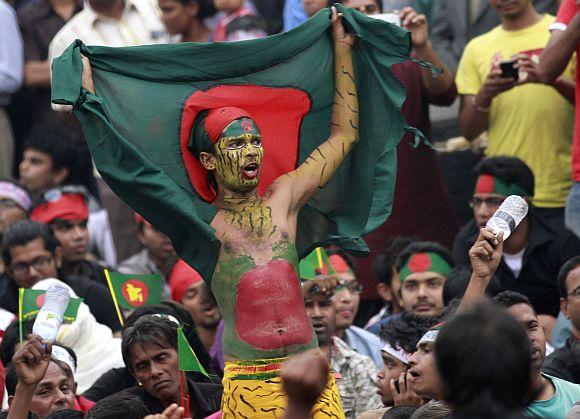
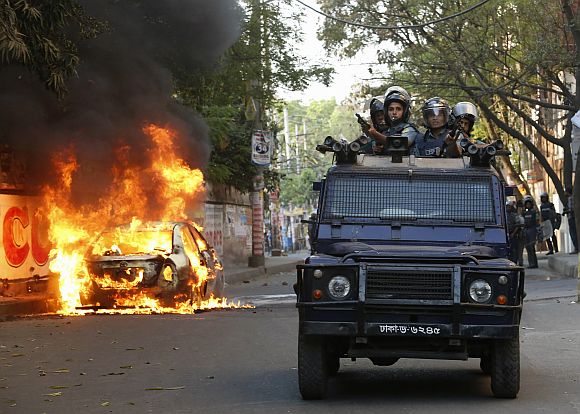
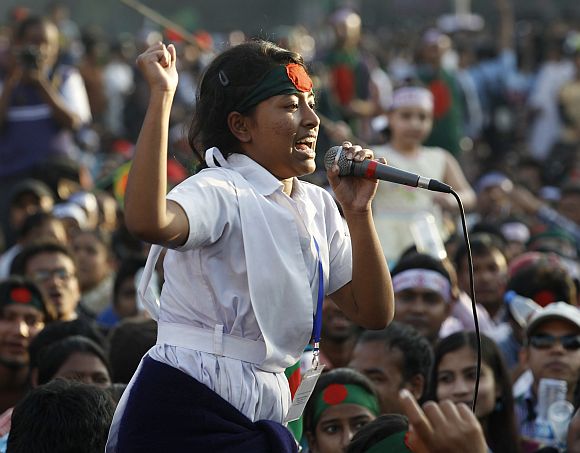
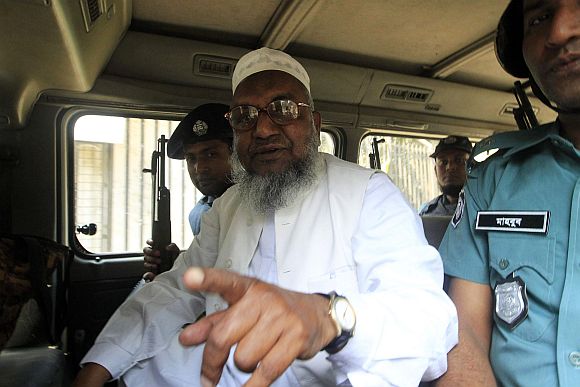

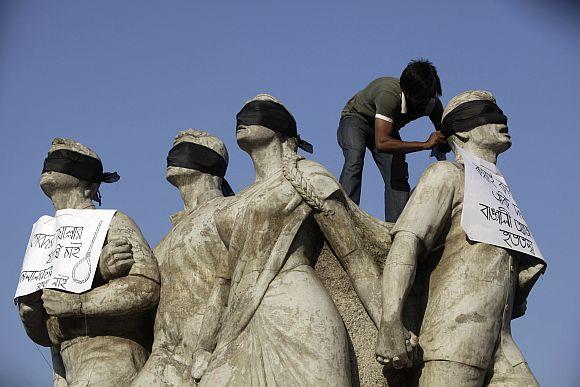
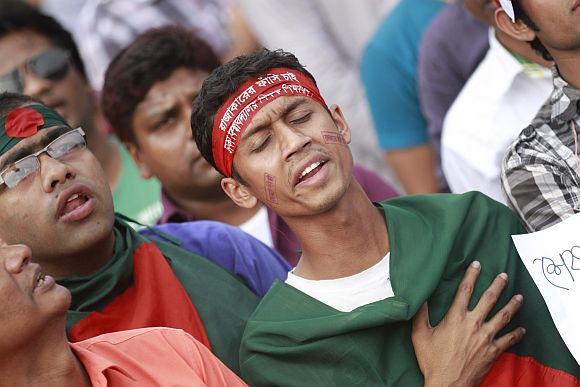
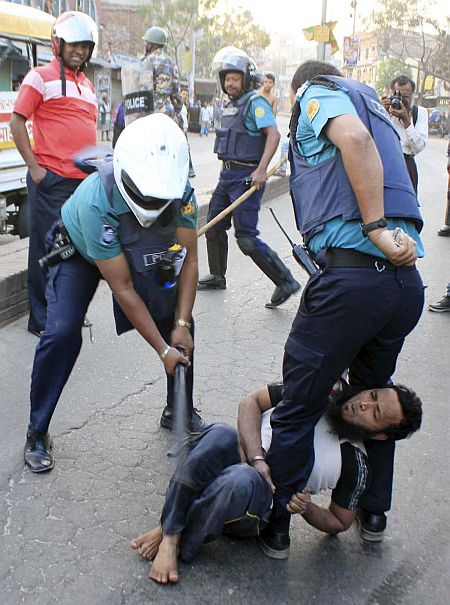

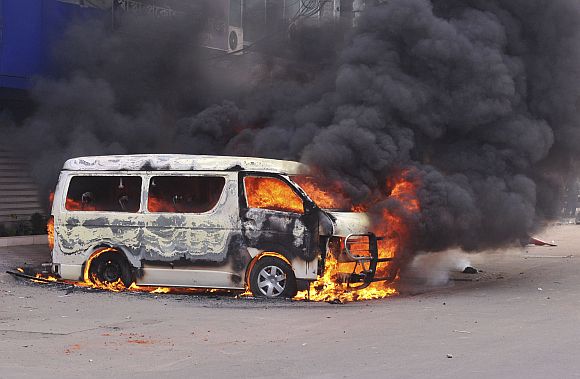
article